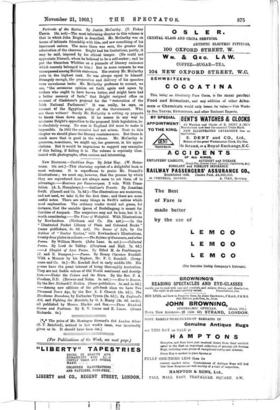Portraits e the Sixties. By Justin McCarthy. (T. Fisher ljnwixt.
158. net)—The most informing chapter in this volume is that in which John Bright is described. Mr. McCarthy was on terms of intimate friendship with him, and saw something of his innermost nature. The more there was seen, the greater the admiration of the observer. Bright had his limitations, partly, it may be said, imposed by his ethical temper. (He could not appreciate Disraeli, whom he believed to be a self-seeker ; and he put the blameless Whittier on a pinnacle of literary eminence which scarcely belonged to him.) But in some respects he was unsurpassed among British statesmen. His oratory Mr. McCarthy puts in the highest rank. He was always equal to himself. Strangely enough, the preparation and delivery of his speeches were unwelcome tasks. Mr. McCarthy professes to correct, we see, "the erroneous opinion set forth again and again by writers who ought to have known better, and might have had a better memory of facts," that Bright resigned office on account of Gladstone's proposal for the "restoration of the Irish National Parliament." It was really, he says, on account ef the Egyptian policy of the Government. Who aro these writers ? Surely Mr. McCarthy is setting up puppets to knock them down again. If he means in any way to minimise Bright's opposition to the proposed Irish legislation, he is absolutely wrong. No man in England did more to make it impossible. In 1882 the occasion had not arisen. Next to this chapter we should place the literary reminiscences. But there is much more that is good in the volume. Mr. McCarthy is generous, sometimes, we might say, too generous, in his appre- ciations. But it would be ungracious to suggest any examples of this failing, if failing it is. The volume is copiously illus- trated with photographs, often curious and interesting.


























































 Previous page
Previous page